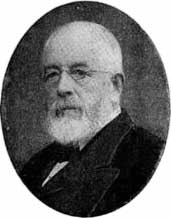Henry Tate
Sir Henry Tate, 1st Baronet (11 March 1819 – 5 December 1899), was an English sugar merchant and philanthropist, noted for establishing the Tate Gallery in London.
Sir Henry Tate | |
|---|---|
 | |
| Born | 11 March 1819 Chorley, Lancashire, England |
| Died | 5 December 1899 (aged 80) |
| Burial place | West Norwood Cemetery, West Norwood, London, England |
| Occupation(s) | Sugar merchant and philanthropist |
| Spouse | Jane Wignall (m. 1841; died 1883) |
| Children | 3 |
Life and career
Born in White Coppice, a hamlet near Chorley, Lancashire, Tate was the son of a Unitarian clergyman, the Reverend William Tate, and his wife Agnes (née Booth). When he was 13, he became a grocer's apprentice in Liverpool. After a seven-year apprenticeship, he was able to set up his own shop. His business was successful, and grew to a chain of six stores by the time he was 35. In 1859 Tate became a partner in John Wright & Co. sugar refinery, selling his grocery business in 1861. By 1869, he had gained complete control of the company, and renamed it as Henry Tate & Sons. In 1872, he purchased the patent from German Eugen Langen for making sugar cubes, and in the same year built a new refinery in Liverpool. In 1877 he opened a refinery at Silvertown, London, which remains in production. At the time, much of Silvertown was still marshland. Tate was a modest, rather retiring man, well known for his concern with workers’ conditions. He built the Tate Institute opposite his Thames Refinery, with a bar and dance hall for the workers' recreation.
Tate became wealthy and donated generously to charity. In 1889 he donated his collection of 65 contemporary paintings to the government, on the condition that they be displayed in a suitable gallery, toward the construction of which he also donated £80,000. The National Gallery of British Art, nowadays known as Tate Britain, was opened on 21 July 1897, on the site of the old Millbank Prison.
Tate made many donations, often anonymously and always discreetly. He supported "alternative" and non-establishment causes. For example, he donated £10,000 for the library of Manchester College, founded in Manchester in 1786 as a dissenting academy to provide religious nonconformists with higher education. He also gave the college (which had retained its name during moves to York, London and finally Oxford), £5,000 to promote the ‘theory and art of preaching’. In addition he gave £20,000 to the (homoeopathic) Hahnemann Hospital in Liverpool in 1885. He particularly supported health and education with his money, giving £42,500 for Liverpool University, £3,500 for Bedford College for Women, and £5,000 for building a free library in Streatham. Additional provisions were made for libraries in Balham, South Lambeth, and Brixton. He also gave £8,000 to the Liverpool Royal Infirmary, and £5,000 to the Queen Victoria Jubilee Institute, which became the Queen's Institute for District Nurses.

(Bronze bust by Thomas Brock, exhibited at Tate Britain)
Tate was made a baronet on 27 June 1898. He had refused this title more than once until – after he had spent £150,000 to build the Millbank Gallery, endowed it with his personal collection, and presented it to the nation – he was told the Royal Family would be offended if he refused again.
In 1921, after Tate's death, Henry Tate & Sons merged with Abram Lyle & Sons to form Tate & Lyle.
In 2001, a blue plaque commemorating Sir Henry Tate was unveiled on the site of his first shop at 42 Hamilton Street, Birkenhead. In 2006 a Wetherspoons pub in his home town of Chorley was named after the sugar magnate.
Personal life
Tate married Jane Wignall on 1 March 1841 in Liverpool. They had three sons. Tate lived at Park Hill by Streatham Common, South London, and is buried in nearby West Norwood Cemetery, the gates of which are opposite a public library that he endowed. Park Hill became a nunnery after his death until refurbishment as housing around 2004.
Gallery
- Vault of Sir Henry Tate, West Norwood cemetery
- Henry Tate Mausoleum
- Tate South Lambeth Library, Vauxhall
- Dedication plaque at Victoria Building, University of Liverpool
Notes and references
- Ingman, Bruce (2014). Henry Tate. Tate Publishing. ISBN 978-1-84976-169-7.
- Chisholm, Hugh, ed. (1911). . Encyclopædia Britannica. Vol. 26 (11th ed.). Cambridge University Press. p. 449.
- Munting, Roger. "Tate, Sir Henry, first baronet (1819–1899)". Oxford Dictionary of National Biography (online ed.). Oxford University Press. doi:10.1093/ref:odnb/26984. (Subscription or UK public library membership required.)
External links

This article uses material from the Wikipedia English article Henry Tate, which is released under the Creative Commons Attribution-ShareAlike 3.0 license ("CC BY-SA 3.0"); additional terms may apply (view authors). Content is available under CC BY-SA 4.0 unless otherwise noted. Images, videos and audio are available under their respective licenses.
®Wikipedia is a registered trademark of the Wiki Foundation, Inc. Wiki English (DUHOCTRUNGQUOC.VN) is an independent company and has no affiliation with Wiki Foundation.



